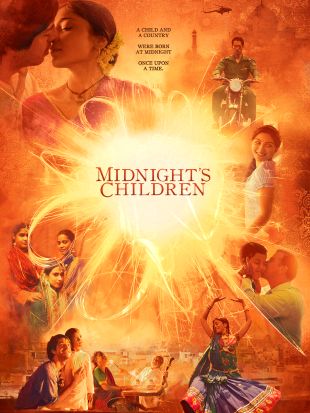
As directed by Deepa Mehta, Midnight's Children constitutes the first major screen adaptation of a Salman Rushdie novel. The source roman, which launched Rushdie's career, garnered unanimous international acclaim and netted the Booker Prize in 1981. It could be described as a sort of Indian equivalent of Gunter Grass's The Tin Drum: Just as Grass did for Germany, Rushdie used the life changes of a single individual to parallel the tumultuous sociopolitical shifts reshaping India; and like Grass, Rushdie built his events on a foundation of magic realism. The conceit involves two male babies born at the stroke of midnight on the eve of India's independence from colonial Britain in 1947; a nurse swaps the infants, sending a poor musician's son named Saleem (Satya Bhabha) to a life of wealth and luxury, and the biological son of Saleem's wealthy parents, Shiva (Siddharth), to be raised in poverty. As a child, Saleem discovers that the timing of his birth somehow imparted the ability to telepathically summon and communicate with hundreds of "midnight's children" -- those born at or around the same moment in history, each of whom possesses a different superpower.
Given Rushdie's literary genius, one doesn't doubt that these events made complete sense and bore total clarity on the page. Although the author adapted his own work for the screen, it unfortunately falls apart on film. The production notes indicate that the original draft would have run almost four and a half hours if shot, and that the belletrist ultimately whittled it down to two and a half. Whatever those changes were, they did serious damage to the movie. The final cut has about the same degree of clarity that Francis Ford Coppola's Youth Without Youth did -- as the Mehta picture hurtles across 30 years of Saleem's life, and through one melodramatic hoop after another, we get enough coherence to be able to elucidate what is happening in any given scene, but the broader connections between the sequences are murky at best and the global parallels will be lost to anyone without a thorough background knowledge of Indian, Pakistani, and Bangladeshi histories.
It's something of a challenge to determine how this story could have functioned more efficiently in a cinematic context, though at a bare minimum, Mehta and Rushdie needed to find a way to render the onscreen sociopolitical allegory less oblique and opaque. The creators try to use intermittent patches of soundtrack narration (read by Rushdie) to give us a faint sense of what is happening on a transnational level over the trajectory of the narrative, but that does little to make the movie any clearer. It is possible that the only solutions might have been to either set up a parallel thread with epic scenes of reenacted national events used as a narrative mirror of Saleem's life, or interpolate the sort of documentary elements that an avant-garde director such as Dusan Makavejev has worked into his films. This type of structural experimentation would carry the movie further away from a traditional Western narrative, but the novel is far-out enough (both conceptually and thematically) that it practically demands a break from convention in order to work properly as a movie.
One is tempted to argue, given the novel's breadth, that the 150-minute length of the Mehta picture also constitutes an inevitable handicap. This may or may not be true; one can think of several film adaptations of novels that somehow preserved the epic scope and social allegories of their source material, and yet succeeded admirably within a reasonable time frame -- including not only Volker Schlöndorff's Palme d'Or-winning cinematization of The Tin Drum (1979), but Aleksandar Petrovic's magnificent Heinrich Böll filmization Group Portrait With a Lady (1977).
Admittedly, everything isn't a total loss in the Mehta film: Several individual sequences possess remarkable dramatic power, particularly those with romantic overtones -- such as the erotic encounter that brings two of Saleem's ancestors together, Saleem's ill-fated attempt to profess his love for his adopted sister, and a late-narrative union between Saleem and a woman he initially meets via telepathy. But how can we be expected to care when the transitions between these events are so poorly rendered, and the film as a whole buckles beneath the weight of meandering, excruciatingly boring passages that do nothing other than try our patience? In the final scene, one learns that a new generation of "Midnight's Children" has been born, which leaves room for the continuation of this story. One can only hope that we will be spared the misery of a sequel.
